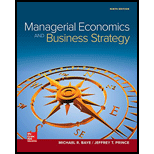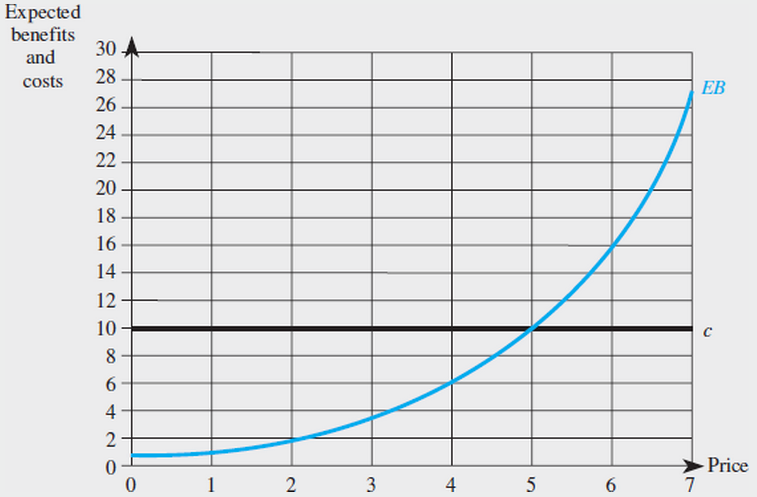
Managerial Economics & Business Strategy (Mcgraw-hill Series Economics)
9th Edition
ISBN: 9781259290619
Author: Michael Baye, Jeff Prince
Publisher: McGraw-Hill Education
expand_more
expand_more
format_list_bulleted
Textbook Question
Chapter 12, Problem 3CACQ
Your store sells an item desired by a consumer. The consumer is using an optimal search strategy; the accompanying graph shows the consumer’s expected benefits and costs of searching for a lower
- What is the consumer’s reservation price?
- If your price is $3 and the consumer visits your store, will she purchase the item or continue to search? Explain.
- Suppose the consumer’s cost of each search rises to $16. What is the highest price you can charge and still sell the item to the consumer if she visits your store?
- Suppose the consumer’s cost of each search falls to $2. If the consumer finds a store charging $3, will she purchase at that price or continue to search?

Expert Solution & Answer
Want to see the full answer?
Check out a sample textbook solution
Students have asked these similar questions
General Accounting Question solution and give me Blank ? C
It is possible to use transformational leadership strategies to reach unethical objectives.
Traditional leadership theories and morals standards are not adequate to help employees solve complex organizational issues.
For the statement above, argue in position for both in favor or opposed to the statements.
Discuss the preferred deterrent method employed by the Zambian government to combat tax evasion, monetary fines. As noted in the reading the potential penalty for corporate tax evasion is a fine of 52.5% of the amount evaded plus interest assessed at 5% annually along with a possibility of jail time. In general, monetary fines as a deterrent are preferred to blacklisting of company directors, revoking business operation licenses, or calling for prison sentences. Do you agree with this preference? Should companies that are guilty of tax evasion face something more severe than a monetary fine? Something less severe? Should the fine and interest amount be set at a different rate? If so at why? Provide support and rationale for your responses.
Chapter 12 Solutions
Managerial Economics & Business Strategy (Mcgraw-hill Series Economics)
Knowledge Booster
Learn more about
Need a deep-dive on the concept behind this application? Look no further. Learn more about this topic, economics and related others by exploring similar questions and additional content below.Similar questions
- answerarrow_forwardDiscuss the preferred deterrent method employed by the Zambian government to combat tax evasion, monetary fines. As noted in the reading the potential penalty for corporate tax evasion is a fine of 52.5% of the amount evaded plus interest assessed at 5% annually along with a possibility of jail time. In general, monetary fines as a deterrent are preferred to blacklisting of company directors, revoking business operation licenses, or calling for prison sentences. Do you agree with this preference? Should companies that are guilty of tax evasion face something more severe than a monetary fine? Something less severe? Should the fine and interest amount be set at a different rate? If so at why? Provide support and rationale for your responses.arrow_forwardNot use ai pleasearrow_forward
- For the statement below, argue in position for both in favor or opposed to the statement. Incompetent leaders can't be ethical leaders. Traditional leadership theories and moral standards are not adequate to help employees solve complex organizational issues.arrow_forwardpresentation on "Dandelion Insomnia." Poemarrow_forwardDon't used Ai solutionarrow_forward
- "Whether the regulator sells or gives away tradeable emission permits free of charge, the quantities of emissions produced by firms are the same." Assume that there are n identical profit-maximising firms where profit for each firm is given by π(e) with л'(e) > 0; π"(e) < 0 and e denotes emissions. Individual emissions summed over all firms gives E which generates environmental damages D(E). Show that the regulator achieves the optimal level of total pollution through a tradeable emission permit scheme, where the permits are distributed according to the following cases: Case (i) the firm purchases all permits; Case (ii) the firm receives all permits free; and Page 3 of 5 ES30031 Case (iii) the firm purchases a portion of its permits and receives the remainder free of charge.arrow_forwardcompare and/or contrast the two plays we've been reading, Antigone and A Doll's House.arrow_forwardPlease answer step by steparrow_forward
- Suppose there are two firms 1 and 2, whose abatement costs are given by c₁ (e₁) and C2 (е2), where e denotes emissions and subscripts denote the firm. We assume that c{(e) 0 for i = 1,2 and for any level of emission e we have c₁'(e) # c₂' (e). Furthermore, assume the two firms make different contributions towards pollution concentration in a nearby river captured by the transfer coefficients ε₁ and 2 such that for any level of emission e we have C₂'(e) # The regulator does not know the resulting C₁'(e) Τι environmental damages. Using an analytical approach explain carefully how the regulator may limit the concentration of pollution using (i) a Pigouvian tax scheme and (ii) uniform emissions standards. Discuss the cost-effectiveness of both approaches to control pollution.arrow_forwardBill’s father read that each year a car’s value declines by 10%. He also read that a new car’s value declines by 12% as it is driven off the dealer’s lot. Maintenance costs and the costs of “car problems” are only $200 per year during the 2-year warranty period. Then they jump to $750 per year, with an annual increase of $500 per year.Bill’s dad wants to keep his annual cost of car ownership low. The car he prefers cost $30,000 new, and he uses an interest rate of 8%. For this car, the new vehicle warranty is transferrable.(a) If he buys the car new, what is the minimum cost life? What is the minimum EUAC?(b) If he buys the car after it is 2 years old, what is the minimum cost life? What is the minimum EUAC?(c) If he buys the car after it is 4 years old, what is the minimum cost life? What is the minimum EUAC?(d) If he buys the car after it is 6 years old, what is the minimum cost life? What is the minimum EUAC?(e) What strategy do you recommend? Why? Please show each step and formula,…arrow_forwardO’Leary Engineering Corp. has been depreciating a $50,000 machine for the last 3 years. The asset was just sold for 60% of its first cost. What is the size of the recaptured depreciation or loss at disposal using the following depreciation methods?(a) Straight-line with N = 8 and S = 2000(b) Double declining balance with N = 8(c) 40% bonus depreciation with the balance using 7-year MACRS Please show every step and formula, don't use excel. The answer should be (a) $2000 loss, (b) $8000 deo recap, (c) $14257 dep recap, thank you.arrow_forward
arrow_back_ios
SEE MORE QUESTIONS
arrow_forward_ios
Recommended textbooks for you

 Economics Today and Tomorrow, Student EditionEconomicsISBN:9780078747663Author:McGraw-HillPublisher:Glencoe/McGraw-Hill School Pub Co
Economics Today and Tomorrow, Student EditionEconomicsISBN:9780078747663Author:McGraw-HillPublisher:Glencoe/McGraw-Hill School Pub Co Exploring EconomicsEconomicsISBN:9781544336329Author:Robert L. SextonPublisher:SAGE Publications, Inc
Exploring EconomicsEconomicsISBN:9781544336329Author:Robert L. SextonPublisher:SAGE Publications, Inc


Economics Today and Tomorrow, Student Edition
Economics
ISBN:9780078747663
Author:McGraw-Hill
Publisher:Glencoe/McGraw-Hill School Pub Co

Exploring Economics
Economics
ISBN:9781544336329
Author:Robert L. Sexton
Publisher:SAGE Publications, Inc

Decision Tree Analysis - Intro and Example with Expected Monetary Value; Author: Vincent Stevenson;https://www.youtube.com/watch?v=cbCsCQ4l4Zs;License: Standard Youtube License